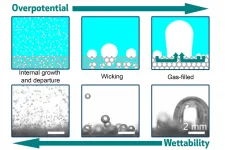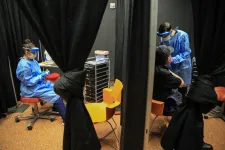(Press-News.org) University of Maryland School of Medicine (UMSOM) researchers have identified the most toxic proteins made by SARS-COV-2--the virus that causes COVID-19 - and then used an FDA-approved cancer drug to blunt the viral protein's detrimental effects. In their experiments in fruit flies and human cell lines, the team discovered the cell process that the virus hijacks, illuminating new potential candidate drugs that could be tested for treating severe COVID-19 disease patients. Their findings were published in two studies simultaneously on March XX in Cell & Bioscience, a Springer Nature journal.
"Our work suggests there is a way to prevent SARS-COV-2 from injuring the body's tissues and doing extensive damage," says senior author of the study Zhe "Zion" Han, PhD, Associate Professor of Medicine and Director of the Center for Precision Disease Modeling at UMSOM. He notes that the most effective drug against Covid-19, remdesivir, only prevents the virus from making more copies of itself, but it does not protect already infected cells from damage caused by the viral proteins.
Prior to the pandemic, Dr. Han had been using fruit flies as a model to study other viruses, such as HIV and Zika. He says his research group shifted gears in February 2020 to study SARS-COV-2 when it was clear that the pandemic was going to significantly impact the U.S.
SARS-COV-2 infects cells and hijacks them into making proteins from each of its 27 genes. Dr. Han's team introduced each of these 27 SARS-CoV-2 genes in human cells and examined their toxicity. They also generated 12 fruit fly lines to express SARS-CoV-2 proteins likely to cause toxicity based on their structure and predicted function.
The researchers found that a viral protein, known as Orf6, was the most toxic killing about half of the human cells. Two other proteins (Nsp6 and Orf7a) also proved toxic, killing about 30-40 percent of the human cells. Fruit flies that made any one of these three toxic viral proteins in their bodies were less likely to survive to adulthood. Those fruit flies that did live had problems like fewer branches in their lungs or fewer energy-generating power factories in their muscle cells.
For the remaining experiments, the researchers focused on just the most toxic viral protein, so they could figure out what cell process the virus hijacks during infection. Dr. Han's team found that the virus' toxic Orf6 protein sticks to multiple human proteins that have the job of moving materials out of the cell's nucleus--the place in the cell that holds the genome, or the instructions for life.
They then discovered that one of these human moving proteins, targeted by the virus, gets blocked by the cancer drug selinexor. The researchers tested selinexor on human cells and fruit flies making the toxic viral protein to see if the drug could help reverse the damage. Selinexor, like many cancer drugs is itself toxic. However, after accounting for its toxic effects, the drug improved human cell survival by about 12 percent. Selinexor prevented early death in about 15 percent of the flies making the toxic viral protein. The drug also restored branches in the lungs and the energy-generators in the muscle cells. Selinexor is FDA-approved to treat certain blood cancers.
"More than 1,000 FDA-approved drugs are in clinical trials to test as treatments for Covid-19, and luckily a trial testing selinexor, the drug used in our study, is being performed already," says Dr. Han. "If this trial proves to be successful, our data will have demonstrated the underlying mechanism for why the drug works."
Albert Reece, MD, PhD, MBA, Executive Vice President for Medical Affairs, University of Maryland Baltimore, and the John Z. and Akiko K. Bowers Distinguished Professor and Dean, University of Maryland School of Medicine, commented, "Although we now have vaccines, it may still be a while before we will have Covid-19 infections under control, especially with the new variants emerging. We will need to tap into every tool in the arsenal available to protect people from needless sickness, disability or even death, and this study guides us towards a new target for potential therapeutics."
INFORMATION:
These two studies were funded by a University of Maryland COVID-19 Accelerated Translational Incubator Pilot Grant, the University of Maryland, the Baltimore Institute for Clinical and Translational Research, and the University of Maryland School of Pharmacy Mass Spectrometry Center.
The researchers do not have any conflicts of interest to report.
About the University of Maryland School of Medicine
Now in its third century, the University of Maryland School of Medicine was chartered in 1807 as the first public medical school in the United States. It continues today as one of the fastest growing, top-tier biomedical research enterprises in the world -- with 45 academic departments, centers, institutes, and programs; and a faculty of more than 3,000 physicians, scientists, and allied health professionals, including members of the National Academy of Medicine and the National Academy of Sciences, and a distinguished two-time winner of the Albert E. Lasker Award in Medical Research. With an operating budget of more than $1.2 billion, the School of Medicine works closely in partnership with the University of Maryland Medical Center and Medical System to provide research-intensive, academic and clinically based care for nearly 2 million patients each year. The School of Medicine has more than $563 million in extramural funding, with most of its academic departments highly ranked among all medical schools in the nation in research funding. As one of the seven professional schools that make up the University of Maryland, Baltimore campus, the School of Medicine has a total population of nearly 9,000 faculty and staff, including 2,500 student trainees, residents, and fellows. The combined School of Medicine and Medical System ("University of Maryland Medicine") has an annual budget of nearly $6 billion and an economic impact more than $15 billion on the state and local community. The School of Medicine, which ranks as the 8th highest among public medical schools in research productivity, is an innovator in translational medicine, with 600 active patents and 24 start-up companies. The School of Medicine works locally, nationally, and globally, with research and treatment facilities in 36 countries around the world. Visit medschool.umaryland.edu
Using electricity to split water into hydrogen and oxygen can be an effective way to produce clean-burning hydrogen fuel, with further benefits if that electricity is generated from renewable energy sources. But as water-splitting technologies improve, often using porous electrode materials to provide greater surface areas for electrochemical reactions, their efficiency is often limited by the formation of bubbles that can block or clog the reactive surfaces.
Now, a study at MIT has for the first time analyzed and quantified how bubbles form on these porous electrodes. The researchers have found that there are three different ways bubbles can form on and depart from the surface, and that these can be precisely controlled ...
Limerick, Ireland, 26 March 2020: Researchers at Lero, the Science Foundation Ireland Research Centre for Software and University of Limerick (UL), have found video gamers can significantly improve their esport skills by training for just 10 minutes a day.
The research team at Lero's Esports Science Research Lab (ESRL) at UL also found novice gamers benefited most when they wore a custom headset delivering transcranial Direct Current Stimulation (tDCS) for 20 minutes before training sessions.
Dr Mark Campbell, director of Lero's Esports Science Research Lab (ESRL) and senior lecturer in sports psychology at UL, said their work showed that neurostimulation could accelerate motor performance improvements specifically in novice esports ...
Patients with lupus are more likely to have metabolic syndrome and insulin resistance - both factors linked to heart disease - if they have lower vitamin D levels, a new study reveals.
Researchers believe that boosting vitamin D levels may improve control of these cardiovascular risk factors, as well as improving long-term outcomes for patients with systemic lupus erythematosus (SLE).
Given that photosensitivity is a key feature of SLE, the scientists say that a combination of avoiding the sun, using high-factor sunblock and living in more northerly ...
What The Study Did: Insurance claims were used to assess patterns of telehealth use across surgical specialties before and during the COVID-19 pandemic.
Authors: Grace F.Chao, M.D., M.Sc., of the National Clinician Scholars Program at the University of Michigan and Veterans Affairs Ann Arbor in Michigan, is the corresponding author.
To access the embargoed study: Visit our For The Media website at this link https://media.jamanetwork.com/
(doi:10.1001/jamasurg.2021.0979)
Editor's Note: The article includes conflict of interest and funding/support disclosures. Please see the article for additional information, including other authors, author contributions ...
What The Study Did: This article discusses possible pathogenic mechanisms of brain dysfunction in patients with COVID-19.
Authors: Maura Boldrini, M.D., Ph.D., of the New York State Psychiatric Institute, Columbia University Irving Medical Center in New York, is the corresponding author.
To access the embargoed study: Visit our For The Media website at this link https://media.jamanetwork.com/
(doi:10.1001/jamapsychiatry.2021.0500)
Editor's Note: The article includes conflict of interest disclosures. Please see the article for additional information, including other authors, author contributions and affiliations, conflict of interest and financial ...
Bariatric surgery can significantly reduce the risk of cancer--and especially obesity-related cancers--by as much as half in certain individuals, according to a study by researchers at Rutgers Robert Wood Johnson Medical School's Center for Liver Diseases and Liver Masses.
The research, published in the journal Gastroenterology, is the first to show bariatric surgery significantly decreases the risk of cancer in individuals with severe obesity and nonalcoholic fatty liver disease (NAFLD). The risk reduction is even more pronounced in individuals with NAFLD-cirrhosis, the researchers say.
"We knew that obesity leads to certain problems, including cancer, but no one ...
The alarm bells began ringing when dozens of eagles were found dead near an Arkansas lake.
Their deaths--and, later, the deaths of other waterfowl, amphibians and fish--were the result of a neurological disease that caused holes to form in the white matter of their brains. Field and laboratory research over nearly three decades has established the primary clues needed to solve this wildlife mystery: Eagle and waterfowl deaths occur in late fall and winter within reservoirs with excess invasive aquatic weeds, and birds can die within five days after arrival.
But until recently, the toxin that caused the disease, vacuolar myelinopathy, was unknown.
Now, after years spent identifying a new toxic blue-green algal (cyanobacteria) species and isolating ...
PITTSBURGH, March 26, 2021 - As evidence mounts supporting the use of monoclonal antibody treatment to reduce hospitalizations and deaths from COVID-19, UPMC and University of Pittsburgh School of Medicine physician-scientists are sharing the health system's experience administering the life-saving medication.
In a report published today in the scientific journal Open Forum Infectious Diseases, the UPMC/Pitt team shares how it quickly established the largest and most equitable distribution network for COVID-19 monoclonal antibody infusions across Pennsylvania. The team today also reported preliminary results confirming the treatment reduced likelihood of hospitalization ...
EL PASO, Texas - Sreenath Chalil Madathil, Ph.D., assistant professor in industrial manufacturing and systems engineering (IMSE) at The University of Texas at El Paso, is working to streamline the process and ease the patient experience at COVID-19 vaccination clinics in the United States to ensure faster vaccine distribution.
Madathil led a team of UTEP faculty, staff and students who observed several of El Paso's drive-though and walk-in clinics in early 2021. The team identified areas that likely created bottlenecks, which produce delays and other issues. They used the information ...
A University of Florida study of middle-aged and older adults finds those who unknowingly carry methicillin-resistant Staphylococcus aureus, or MRSA, on their skin are twice as likely to die within the next decade as people who do not have the bacteria.
"Very few people who carry MRSA know they have it, yet we have found a distinct link between people with undetected MRSA and premature death," said the study's lead author Arch G. Mainous III, Ph.D., a professor in the department of health services research, management and policy at the UF College of Public Health and Health Professions, part of UF Health, the university's academic health center.
The findings suggest that routine screening for undetected ...





